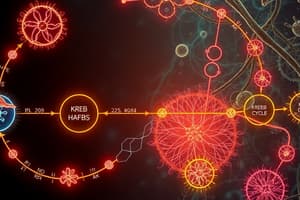Podcast
Questions and Answers
Before entering the Krebs cycle, pyruvate is converted to?
Before entering the Krebs cycle, pyruvate is converted to?
Acetyl-CoA
A single turn of the Krebs cycle will yield?
A single turn of the Krebs cycle will yield?
1 ATP, 3 NADH, 1 FADH2
The initial reaction of the Krebs cycle involves the addition of?
The initial reaction of the Krebs cycle involves the addition of?
2 carbon molecule to a 4 carbon molecule
The Krebs cycle occurs in the mitochondria.
The Krebs cycle occurs in the mitochondria.
A single turn of the Krebs cycle involves 4 different decarboxylation reactions.
A single turn of the Krebs cycle involves 4 different decarboxylation reactions.
Flashcards are hidden until you start studying
Study Notes
Krebs Cycle Overview
- Pyruvate is converted to Acetyl-CoA before entering the Krebs cycle, linking glycolysis to this metabolic pathway.
- A single turn of the Krebs cycle produces 1 ATP, 3 NADH, and 1 FADH2, which are crucial for cellular energy production.
Initial Reaction
- The cycle begins with the addition of a 2-carbon molecule (Acetyl-CoA) to a 4-carbon molecule (oxaloacetate) to form a 6-carbon compound (citrate).
Location
- The Krebs cycle takes place in the mitochondria, the powerhouse of the cell, highlighting its role in aerobic respiration.
Decarboxylation Reactions
- Contrary to the statement of 4 decarboxylation reactions occurring in a single turn, only 2 decarboxylation steps take place, resulting in the release of carbon dioxide.
Additional Notes
- The Krebs cycle is also known as the citric acid cycle or the tricarboxylic acid (TCA) cycle, emphasizing its significance in metabolic processes.
- NADH and FADH2 generated are key electron carriers that feed into the electron transport chain for ATP synthesis.
Studying That Suits You
Use AI to generate personalized quizzes and flashcards to suit your learning preferences.




